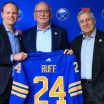Lindsay, Kelly, Howell among deaths in hockey world in 2019
Red Wings icon, eight-time Cup winner, longtime Rangers defenseman three of game's greats to die in past year
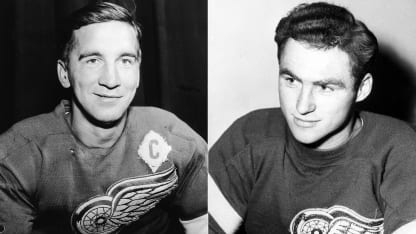
For all the tremendous accomplishments that took place in hockey during 2019, the year was also defined by those we lost, including two members of the Detroit Red Wings dynasty of the 1950s, a Hall of Fame defenseman who played 22 seasons in the NHL and a beloved longtime League executive.
Here's a look at some of those in the hockey world died during the past year, in chronological order:
Red Sullivan
Jan. 19, 2019 (Age 89)
Sullivan, a feisty center, spent 11 seasons in the NHL, playing 302 of his 557 games with the New York Rangers. His best season came in 1958-59, when he had NHL career highs of 21 goals and 63 points for New York. He coached the Rangers in the mid-1960s, then became the first coach of the Pittsburgh Penguins in 1967 but was fired after two seasons. Sullivan also coached 18 games with the first-year Washington Capitals in 1974-74. He never won the Stanley Cup as a player but did earn a ring as a scout for the 1972 Boston Bruins.
Andy Hebenton
Jan. 29, 2019 (Age 89)
Hebenton, a right wing, was 25 when the Rangers purchased him from Victoria of the Western Hockey League after he scored 46 goals in 1954-55. He scored 24 goals with New York as a rookie in 1955-56 and played every game for the Rangers in eight consecutive seasons, winning the Lady Byng Trophy in 1956-57 and finishing with NHL career highs of 33 goals and 62 points in 1958-59. The Boston Bruins claimed him on waivers before the 1963-64 season, and he again played all 70 games, giving him the NHL record of 630 consecutive games. The Bruins sold him to Portland of the WHL in 1964. He spent the next 11 seasons in the WHL, nine with Portland, before retiring after the 1974-75 season, his 26th in professional hockey, more than anyone else except Gordie Howe and Jaromir Jagr.
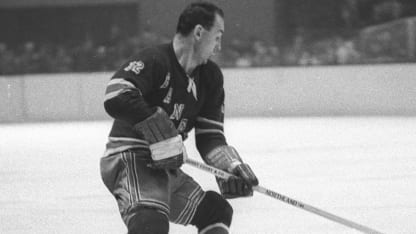
© B Bennett/Getty Images
Andre Boudrias
Boudrias was 20 when he made his NHL debut with his hometown team, the Montreal Canadiens, in 1963-64, but spent most of the next three seasons in the minors before being traded to the Minnesota North Stars on June 6, 1967. However, the center's career took off after he ended up with the expansion Vancouver Canucks in 1970, finishing with at least 61 points in each of his first five seasons with Vancouver. After retiring as a player, Boudrias returned to the Canadiens as a scout and assistant general manager, then spent two decades as a scout with the New Jersey Devils, helping to build Stanley Cup-winning teams in 1995, 2000 and 2003.
Ted Lindsay
Lindsay was part of the famed "Production Line," one of the most famous lines in NHL history, and a key to the Detroit Red Wings dynasty in the early 1950s when they won the Stanley Cup four times in a span of six seasons and finished first for seven consecutive seasons. He led the NHL in goals (33) in 1947-48 and won the Art Ross Trophy as the top scorer in the NHL in 1949-50. Though Terrible Ted also finished with more than 100 penalty minutes 10 times in 17 NHL seasons, he retired with 851 points (379 goals, 472 assists) in 1,068 games and was an eight-time First-Team NHL All-Star. He was inducted into the Hockey Hall of Fame in 1966. In 2010, the NHL Players Association renamed its annual award for the most outstanding player during the regular season from the Lester B. Pearson Award to the Ted Lindsay Award in honor of his work helping to form the NHLPA. He was named one of the
100 Greatest NHL Players in 2017.
Harry Howell
No member of the Rangers has played more games than the 1,160 Howell did from 1952-69. He also played in the NHL with the Oakland/California Golden Seals and Los Angeles Kings and didn't play his final game as a pro until age 44. Howell, known for his smart, steady play, won the Norris Trophy as the NHL's top defenseman in 1966-67, when he also became the first player in Rangers history to play 1,000 games. He finished his NHL career with 418 points (94 goals, 324 assists), was elected to the Hockey Hall of Fame in 1979 and had his No. 3 retired by the Rangers in 2009. Howell never won the Stanley Cup as a player but did do it as a scout with the Edmonton Oilers in the 1980s.
Reflecting on the Hall of Fame career of Harry Howell
Denis Dupere
April 14, 2019 (Age 70)
Dupere, a left wing from Jonquiere, Quebec, was 22 when he came to the NHL with the Toronto Maple Leafs during the 1970-71 season. He became a regular the following season and had 36 points (13 goals, 23 assists) in 1972-73 despite being used mainly as a checker and penalty-killer. The Capitals selected him in the 1974 NHL Expansion Draft, and he had 20 goals in 53 games before being traded to the St. Louis Blues late in the season. Dupere finished his NHL career with the Colorado Rockies in 1978-79, retiring with 179 points (80 goals, 99 points) in 421 games.
Red Kelly
Kelly played on more Stanley Cup-winning teams than any player in NHL history who never played for the Canadiens, winning four championships as a defenseman with the Red Wings in the 1950s and four as a center with the Maple Leafs in the 1960s. As a slick puck-moving defenseman, he was voted winner of the first-ever Norris Trophy in 1954 and reached double figures in goals for nine consecutive seasons; as a center, he was instrumental in helping the Maple Leafs win the Cup from 1962-64 (while also serving as a member of Parliament) and again in 1967 before retiring. He finished his NHL career with 823 points (281 goals, 542 assists) in 1,316 regular-season games. Kelly was inducted into the Hockey Hall of Fame in 1969 and named one of the
100 Greatest NHL Players in 2017.
Greg Johnson
Johnson, a center, had his most productive time in the NHL with the Nashville Predators, for whom he had 238 points (93 goals, 145 assists) in seven seasons from 1998-2006 after being selected in the 1998 NHL Expansion Draft. He had an NHL career-high 50 points (16 goals, 34 assists) in 1998-99 and was captain of the Predators from 2002-06. Johnson finished his NHL career with 369 points (145 goals, 224 assists) in 785 regular-season games with the Predators, Chicago Blackhawks, Penguins and Red Wings, and had 13 points (seven goals, six assists) in 37 Stanley Cup Playoff games. He also won a silver medal with Canada at the 1994 Lillehammer Olympics.
Mike Christie
July 11, 2019 (Age 69)
Christie is technically the NHL's first Texas-born player; his father was a Canadian citizen working for an American oil company, and though the defenseman was born in Big Spring, Texas, he grew up in Canada. After four seasons at the University of Denver and two with Dallas of the Central Hockey League, Christie joined the Golden Seals in 1974-75 and stayed with them through their relocation to Cleveland in 1976. He was traded to the Rockies on Jan. 12, 1978 and was captain of the Rockies for part of the 1979-80 season. The Rockies traded him to the Canucks on Dec. 8, 1980, and he retired after the 1980-81 season with 116 points (15 goals, 101 assists) in 412 NHL games.
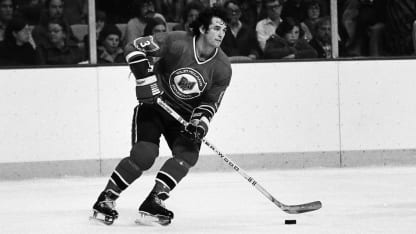
© Steve Babineau/Getty Images
Arnie Brown
Brown, a much-heralded defenseman in junior hockey, was part of one of the biggest trades of the 1960s. He was one of five players sent by the Maple Leafs to the Rangers for forwards Andy Bathgate and Don McKinney on Feb. 22, 1964. The trade helped the Maple Leafs win their third consecutive Stanley Cup championship two months later, but it also opened a path to the NHL for Brown, who became a regular with the rebuilding Rangers. He had NHL career highs of 15 goals and 36 points in 1969-70 but was sent to the Red Wings on Feb. 2, 1971, in a trade that brought forward Bruce MacGregor to New York. Brown played with the Red Wings, New York Islanders and Atlanta Flames until leaving the NHL in 1975 with 185 points (44 goals, 141 assists) in 681 games.
Paul Meger
Aug. 27, 2019 (Age 90)
Meger, a high-scoring center in junior hockey and the American Hockey League, spent his entire NHL career with the Canadiens after joining them during the 1950 Stanley Cup Playoffs. His best season came in 1951-52, when he had 42 points (24 goals, 18 assists) in 69 games, and in 1953 he helped them dethrone the Red Wings as champions. His career was ended in 1955 when he sustained a head injury after accidentally being kicked by a skate during a game. Meger finished with 91 points (39 goals, 52 assists) in 212 NHL games.
Larry Hale
Sept. 27, 2019 (Age 77)
The longtime minor league defenseman got his chance to play in the NHL when the League expanded to 12 teams in 1967. Hale was an original member of the Philadelphia Flyers and spent four seasons with them, finishing with 42 points (five goals, 37 assists) in 196 games. After being sent to the minors early in the 1971-72 season, he signed with Houston of the World Hockey Association and played six seasons there and one with Spokane of the Western Hockey League before retiring as a player in 1979.
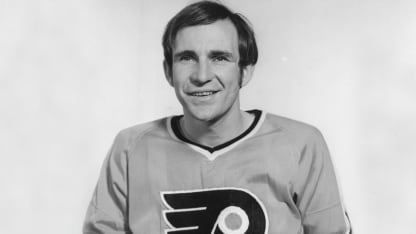
© B Bennett/Getty Images
Ted Green
Known for his physical style of play, Green made his NHL debut with the Bruins on Nov. 10, 1960, and became an NHL regular the following season. Though Green had more than 100 penalty minutes in each of his first five NHL seasons, his skills became more apparent while the Bruins improved. He missed Boston's run to the Stanley Cup in 1970 because of a head injury but was a member of the 1972 Cup-winners before signing with the New England Whalers of the new World Hockey Association. Green had 254 points (48 goals, 206 assists) in 621 NHL games, as well as 12 points (four goals, eight assists) in 31 playoff games. He won five more championships as an assistant under former Bruins teammate Glen Sather with the Edmonton Oilers during their run of five Stanley Cup championships from 1983-84 through 1989-90.
Danny Grant
The Fredericton, New Brunswick, native earned a Stanley Cup ring with the Canadiens in May 1968, but Montreal's glut of forwards kept him from earning a regular role. Grant was traded to the North Stars a month later; still technically a rookie, he had 65 points (34 goals, 31 assists) in 1968-69 and was voted winner of the Calder Trophy. Grant scored at least 29 goals in four of the next five seasons for the North Stars, but he had his best season after being traded to the Detroit Red Wings on Aug. 27, 1974. Playing on a line with Marcel Dionne, Grant scored 50 goals and had 87 points in 1974-75. Injuries hampered him after that, and he retired after the 1978-79 season with 536 points (263 goals, 273 assists) in 736 NHL games. After retiring, he coached in college and junior hockey.
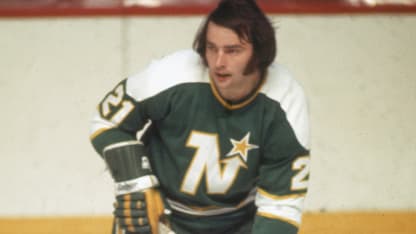
© B Bennett/Getty Images
Jim Gregory
Gregory was a worldwide hockey ambassador and among the first NHL general managers to sign and import players from Europe -- most notably, defenseman Borje Salming -- during the Hockey Hall of Famer's 10-year tenure (1969-79) as GM of the Toronto Maple Leafs. He was key to the implementation of some of the NHL's most transformational innovations during his four decades working for the League, including the use of video to review goals and the expansion of the role of the Central Scouting Bureau. As chairman of the Hall of Fame's selection committee for 16 years, Gregory placed the phone calls that notified inductees of their honor. As NHL senior vice president of hockey operations, he called out the names, junior and scholastic hockey affiliations, and new homes of draft picks at more than 30 drafts. In 2012, the Canadian Hockey League announced that the player of the game awards at the annual CHL/NHL Top Prospects Game would be named in his honor. He received the Order of Hockey in Canada in 2015.
Dean Prentice Nov. 2, 2019 (Age 87)
Prentice had 860 points (391 goals, 469 assists) in 1,378 NHL games during 22 seasons with five teams, beginning with the Rangers from 1952-63. Prentice was a consistent rather than a prolific scorer; he never had more than the 32 goals and 66 points he amassed for the Rangers in 1959-60 but was good enough to score 26 goals for the Minnesota North Stars as a 40-year-old in 1972-73. Prentice came closest to winning the Stanley Cup with the Detroit Red Wings in 1966, finishing with 10 points (five goals, five assists) in 10 playoff games. The Red Wings won the first two games of the Cup Final against the Montreal Canadiens but lost the next four and didn't return to the Final until 1995.
Bill McCreary Nov. 25 (age 84)
McCreary, a longtime minor league left wing who had cups of coffee with Rangers, Red Wings and Canadiens during the 1950s and 1960s, got a late-career chance at a full-time job after the 1967 NHL Expansion. He made the most of it, earning a regular role at age 33 with the Blues and helping them advance to the Stanley Cup Final in 1968, 1969 and 1970. He retired as a player after the 1970-71 season with 115 points (53 goals, 62 assists) in 309 NHL games. McCreary also coached the Canucks (1973-74), then became general manager (and briefly coach) of the Golden Seals in 1974 and remained with the franchise after it moved to Cleveland for the 1976-77 season. His younger brother, Keith McCreary, and son Bill McCreary Jr. also played in the NHL.
George Ferguson Dec. 16, 2019 (age 67)
The Maple Leafs selected Ferguson No. 11 in the 1972 NHL Draft, and he was an NHL regular in 1972-73, finishing with 23 points (10 goals, 13 assists) in 72 games. Ferguson spent most of the following season in the minors but returned to the NHL to stay in 1974-75 and spent the next four seasons with the Maple Leafs before being traded to the Penguins on June 14, 1978. He had four consecutive 20-goal seasons with the Penguins and scored the series-winning goal for Pittsburgh against Buffalo in the 1979 Preliminary Round before being traded to the North Stars on Oct. 28, 1982. He retired after the 1983-84 season with 398 points (160 goals, 238 assists) in 797 NHL games.
Scot KleinendorstDec. 17, 2019 (Age 59)
Kleinendorst died 10 days after being injured in an accident at the Minnesota paper mill where he worked. The defenseman was a college star at Providence before coming to the NHL in 1982-83 with the Rangers, who had selected him in the fifth round (No. 98) of the 1980 NHL Draft. He was acquired by the Hartford Whalers in a trade on Feb. 27, 1984 and played five seasons with Hartford before finishing his NHL career by playing 18 games with the Washington Capitals. Kleinendorst finished his NHL career with 58 points (12 goals, 46 assists) in 281 games. His younger brother, Kurt Kleinendorst, was drafted by the Rangers in the fourth round (No. 77) of the 1980 NHL Draft but never played in the League.
Bronco Horvath
After five seasons in the minors, Horvath finally got his chance to play in the NHL as a 25-year-old with the Rangers in 1955-56. He spent the next eight seasons playing varying amounts of time with five of the Original Six teams (missing the Red Wings). His best season was 1959-60, the third of his four with the Bruins, when he had 80 points (39 goals, 41 assists) and came within one point of winning the NHL scoring championship -- losing the title to Bobby Hull on the final night of the season. Horvath was demoted to the minors in 1963 and spent most of the rest of his career with Rochester, where he won three American Hockey League championships. His last NHL stint was 14 games with the first-year North Stars in 1967. Horvath had 326 points (141 goals, 185 assists) in 434 NHL games; he was inducted into the AHL Hall of Fame in 2015.
